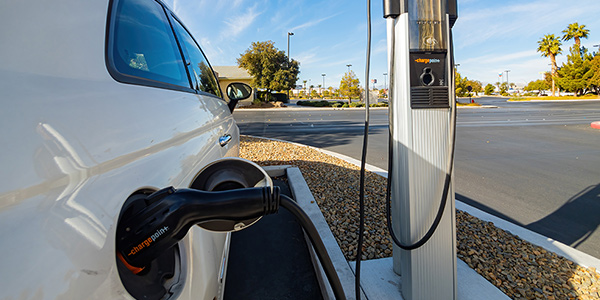As more fuel-efficient cars and electric vehicles hit the roads, the Nevada legislature is looking for ways to make up for declining gas tax revenue that funds highway repairs.
The issue came up during a committee hearing Monday on Senate Bill 191 sponsored by Sen. James Settelmeyer (R).
The bill would impose a 10% surcharge on electric service sold by an EV charging station. Charging station operators would collect the surcharge from customers and send it each month to the Department of Motor Vehicles. From there, the money would go to the state treasurer and into the state Highway Fund.
The Senate Committee on Growth and Infrastructure heard comments on the bill on Monday but took no action.
In presenting the bill to the committee, Settelmeyer admitted the legislation could be a long shot.
“This is not April Fool’s Day,” he said. “But you actually have the Senate minority leader in front of you with a two-thirds bill seeking to increase taxes.”
The potential advantage of SB191 is that it takes a simple “pay at the pump” approach, Settelmeyer said. People who charge their vehicle at home would not pay the surcharge, and there would be no surcharge if the electric service was provided at no cost.
Settelmeyer said there were discussions of possibly amending the bill to give some of the collected surcharge to counties, which are responsible for maintaining many of Nevada’s roads.
He said the bill could also be modified to apply a surcharge to other EV energy sources, such as hydrogen.
“Who knows what the future holds,” he said. “Let’s try to be far reaching so we don’t have to come back and do this again.”
Paying for Roads
Lynn Chapman, treasurer of the Independent American Party of Nevada, said the group supports SB191 even though it usually doesn’t support tax increases.
“Everyone uses the roads and highways,” Chapman said. “But only diesel and gas vehicles are the ones that are targeted to pay the big bucks for our roads and highways.”
Katherine Stainken, policy director with Plug In America, said the bill would hurt EV drivers who use public charging stations — often lower-income drivers who live in multifamily housing.
And, typically, 20% or less of EV charging is done at stations, meaning the surcharge would raise a limited amount of money for roads, Stainken added.
Matt Rubin, clean energy policy analyst with Western Resource Advocates, said the surcharge would make it less economically feasible to run charging stations, which already face costs from upgrading electric distribution systems.
Nationwide Issue
The question of how to ensure gas taxes keep up with funding needs for roads is one that’s being asked across the U.S.
The Natural Resources Defense Council has proposed a two-part system to address the issue.
In the first part, the gas tax would be indexed to inflation and total fuel consumption. For example, if the inflation rate was 1% and total fuel consumption decreased by 1% in a year, gas taxes would increase 2% the following year, according to a blog post on the council’s website. Some states already adjust their fuel taxes based on inflation, NRDC said.
The second part of the NRDC system would be to assess an annual fee on EVs based on the miles-per-gallon-equivalent rating of the model, the gas tax and the number of miles driven each year. NRDC said EVs aren’t currently a significant contributor to transportation funding shortfalls.
Working Group Proposed
In Nevada, the Legislative Committee on Energy, which meets between the legislature’s biennial sessions, plans to introduce a bill to require the Nevada Department of Transportation to form a working group to look at a range of transportation issues.
Those would include an analysis of the NRDC gas tax model as well as Utah’s road usage charge program.
Utah charges an alternative-fuel vehicle fee for electric cars each year on top of the annual registration fee. The road usage charge program allows owners of electric or hybrid vehicles to opt out of the flat fee and instead pay 1.5 cents per mile, according to the program’s website. The mileage-based fee is capped at the amount of the flat fee.
Privacy Concerns
Settelmeyer said he didn’t think his bill would create an economic hardship for most people. He said the cost of a charge at a Level 2 station is about $1.50 an hour, and so a seven-hour charge would cost about $11. The $1.10 surcharge in that case “isn’t going to kill them,” he said, and would provide some money for the state’s dwindling Highway Fund.
Settelmeyer said he’s open to working with lawmakers on other possible solutions to the problem. But he warned that mileage-based systems might not go over well with residents.
“Some of my constituents don’t really like the idea of telling Uncle Sam how many miles they tend to drive on a regular basis,” he said.




